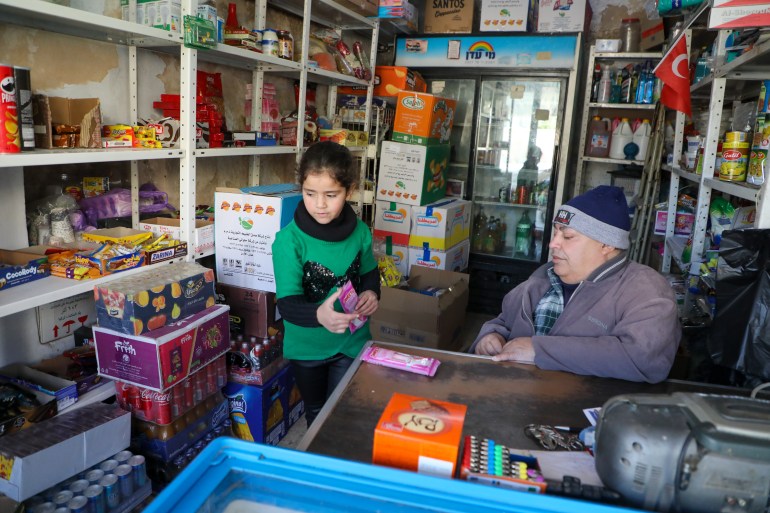This Hebron grocer won’t let Israeli shutdowns stop him
Ishaq Qafisheh has worked in the falafel shop-turned-grocer for as long as he can remember, and plans to continue.
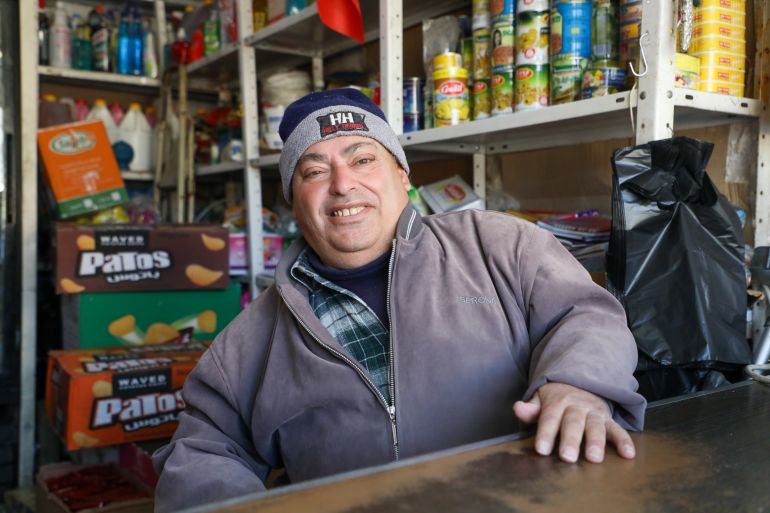
Hebron, occupied West Bank – Ishaq Qafisheh steers his wheelchair around the Ibrahimi Mosque, resting his trusty crutch on his shoulder as he rolls along. That crutch has been a lifelong companion since he was struck with polio as a small child.
The 60-year-old is going to open his tiny grocery shop for the day, one of a few that remained open in the courtyard after the Israeli military closed most of them following the Ibrahimi Mosque massacre in 1994.
Keep reading
list of 4 items‘Shame on you’: Protesters heckle White House correspondents’ dinner guests
Palestinians in Rafah express thanks to US university protesters
‘Shame on you’: Pro-Palestine protest at White House correspondents’ dinner
It is more like a prison canteen than a grocery shop, Qafisheh says as he settles into his seat in the 12sq-metre space (129sq feet), but it provides some essential basics for people who live nearby, trapped by Israeli checkpoints hemming them in tightly.
“The Palestinians who buy my groceries are prisoners, just like those in any prison. My only customers are the people who live inside the checkpoints,” Qafisheh says.
From falafel to groceries
Qafisheh has worked in this shop for as long as he can remember.
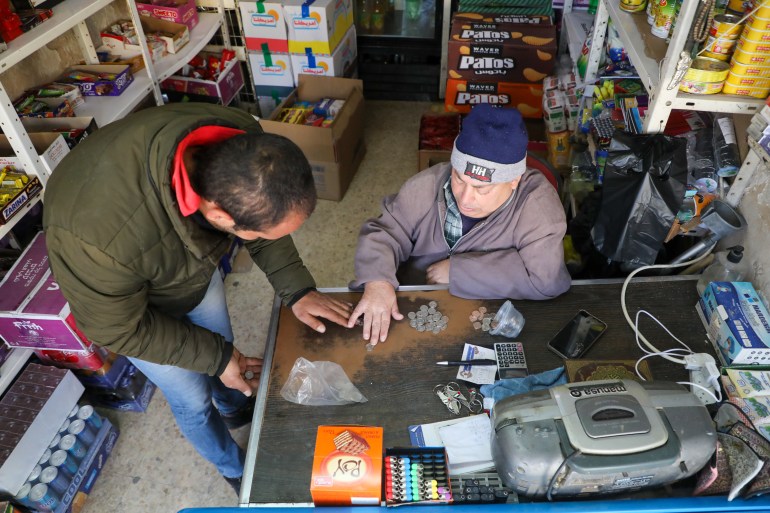
It used to be a falafel restaurant up until about 30 years ago when he decided to transform it into a small grocer, which would make it easier for him to work there.
Now, he sells basic food items along with crowd-pleasers like sweets and chocolates, ice creams, snacks, carbonated drinks and juices.
He lives upstairs from his shop with his wife and three children, one son and two daughters.
His son Osama, 23, helps him receive deliveries, stock the shelves, and watch the shop. Osama finished high school and decided to work with his father, who has dedicated his life to this spot and this shop.
“I love seeing the Ibrahimi Mosque and its visitors,” Qafisheh says. “I love receiving my neighbours in my shop, catching up with them and their news. This shop has become ‘the soul’ of this area.
“My grocery is my soul, and the Ibrahimi Mosque is my life,” he continues. “This is where I was born and raised with my family, and I stayed despite many others leaving as a result of the occupation’s policies and obstacles.
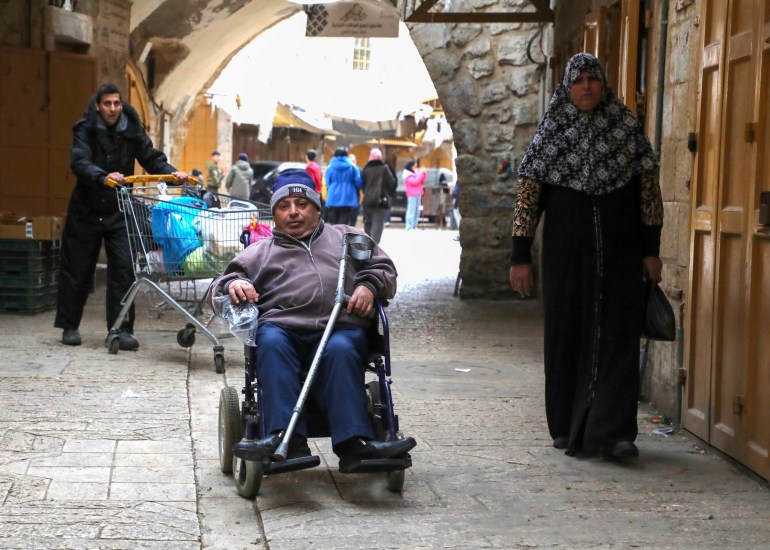
“But I’m staying, in my home and in my shop.”
Hemmed in, choked off
About 68 families live within the Israeli military checkpoints around the Ibrahimi Mosque area – which lies within H2, an area under Israeli control in Hebron.
This makes for a total of about 400 people unable to move outside the checkpoints, frozen in place by a curfew imposed by Israel since its war on Gaza began on October 7.
There are more than 20 Israeli checkpoints, including gates, checkpoints, soldiers and more soldiers keeping them locked in, except for half an hour in the morning on Sundays, Tuesdays and Thursdays when they can leave, and an hour during the evening on the same days when they are allowed to return.
Movement was slightly easier before the war on Gaza began, before the curfew, but everyone living around the mosque still had to pass the checkpoints.
For the first 130 days after October 7, Qafisheh remembers acutely, there were no shops allowed to open within the area enclosed by checkpoints, which meant everybody had to leave to buy the tiniest item, including Qafisheh.
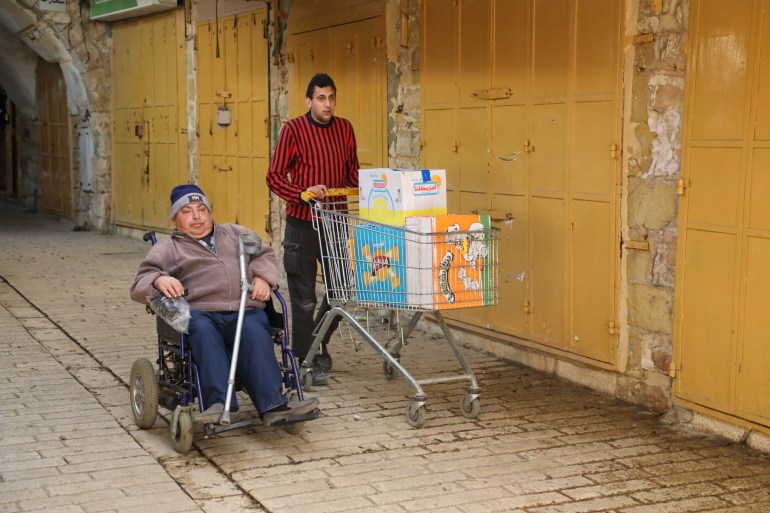
He would head out with his wife and son, Osama, to buy whatever they needed. Until finally he was allowed to reopen his own grocery shop, because it carried essentials and because his health condition made securing what he needed from beyond the checkpoints.
He was overjoyed and immediately got to work dusting and washing down the shelves which had accumulated a thick layer of dust during the four months of closure – he had not been allowed out of his house to check on the shop.
The next step was restocking, which required placing an order over the phone from a supplier who could only get as far as 300 metres (330 yards) from the outside of the checkpoints.
Undeterred, Qafisheh wheeled himself out, accompanied by Osama, so they could receive and inspect everything and take it back through the checkpoints themselves.
Getting stock back does not always go smoothly, and Qafisheh has lost ice creams and other refrigerated items when he got held up at checkpoints, sometimes for hours at a time.
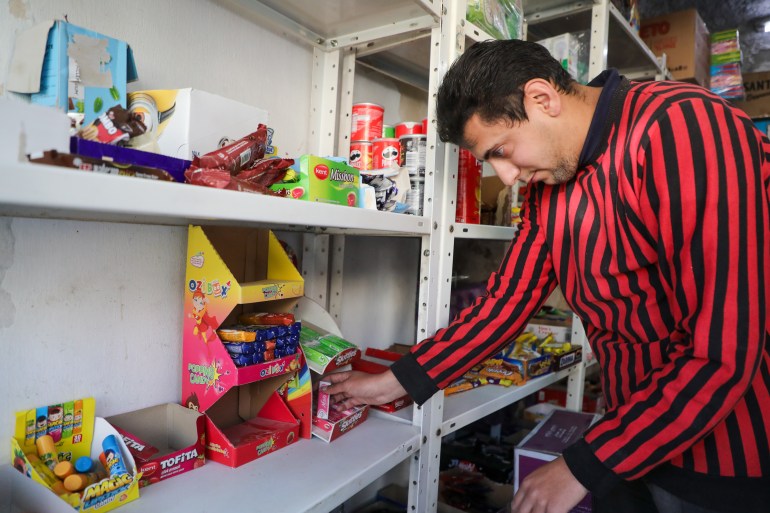
Happy to be back
That Qafisheh is happy to be behind his shop counter is clear to everyone who sees him and his contented smile. Passers-by stop to greet him and exchange news about anything and everything.
Business is a little slow, as the economic crisis that has everyone in the occupied West Bank in its grip means nobody has much cash to spend, but for Qafisheh, returning to his shop was a matter of his own sovereignty and that he will stay in his shop, no matter what.
“I can do it. I’ve been through the closures and curfews. People were depressed, suffering, and lived in fear of settler attacks, especially during the night.
“Homes were stormed by the army most often while people were sleeping, and the settlers launched most of their attacks during that time too.
“We’ve seen the settler attacks escalate all over the West Bank, around us, around where we live. And the army and settlers have imprisoned us in our homes.”
But, he continues, he will keep doing what he does, and will try to expand the shop’s offerings to include more basics that his neighbours need so much, especially as Ramadan approaches.
